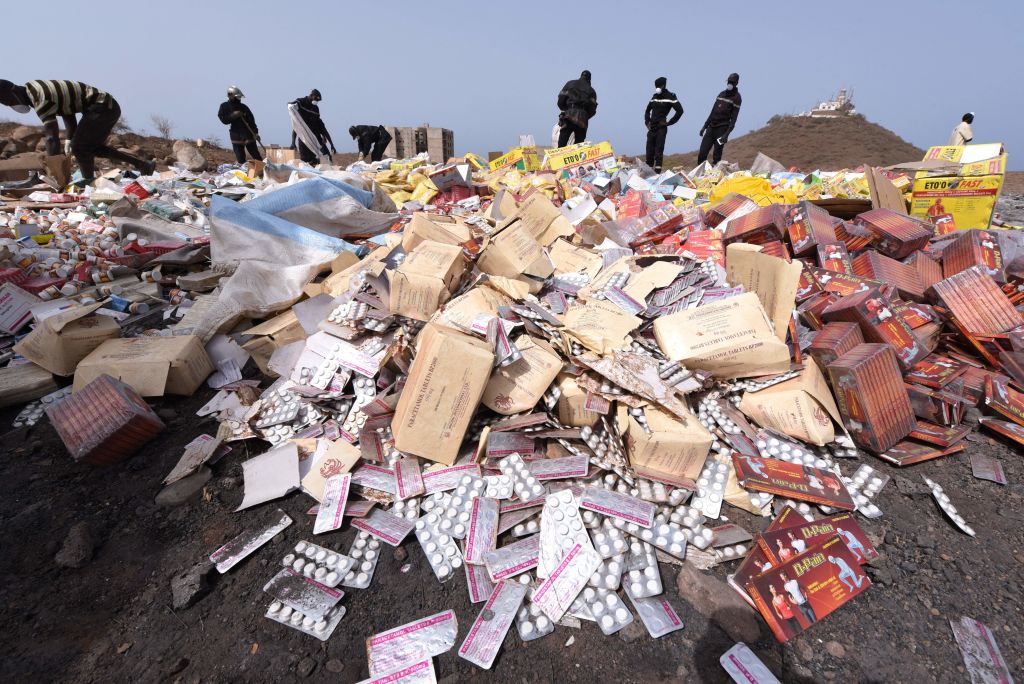Sahel, West Africa Face Scourge of Illegal Medicine Trafficking
ADF STAFF
The world was shocked last year at the deaths of nearly 70 children in The Gambia that were linked to cough syrup from India.
The medicines contained “unacceptable” levels of diethylene and ethylene glycol, and the children developed acute kidney problems after taking the medicines, which may have been distributed through informal markets, according to the World Health Organization (WHO).
The incidents, which WHO head Tedros Adhanom Ghebreyesus characterized as “beyond heartbreaking,” highlighted a trend of illicit drug and medicine trafficking to and from the Sahel region and West Africa.
Illegal drugs and medicines kill nearly 500,000 people in Sub-Saharan Africa annually, according to a February 2023 United Nations Office on Drugs and Crime (UNODC) report. Nearly $45 million per year is spent on treating people who have used counterfeit or substandard malaria treatments.
Up to 267,000 deaths per year in the region are linked to falsified and substandard antimalarial medicines, and more than 169,200 deaths are linked to falsified and substandard antibiotics used to treat severe pneumonia in children.
According to the report, up to 50% of medicines in West Africa are fake or substandard. Medicines from countries such as China, Belgium, France and India typically arrive in the region at ports in Benin, Ghana, Guinea, Nigeria and Togo.
The dangerous medicines mostly are antiparasitic products, such as anti-malarials, antibiotics, opioids such as tramadol, and products related to sexual and reproductive health. Tramadol is by far the most trafficked drug in West Africa.
“Once a [legitimate] product is diverted from the supply chain, there is very little [oversight] about how it is being used,” said Francois Patuel, head of the UNODC’s Research and Awareness Unit. “If you … ask for an antibiotic in the market, you will be able to purchase it. Whether it is the right antibiotic that should be used, or should be used at all, is not something that is controlled. It is contributing to bacterial resistance and to antimalarial resistance.”
Once in West Africa, smugglers move medical products by bus, cars and trucks to the Sahel to avoid border controls. The products are commonly trafficked through routes used for centuries for trade.
“Transnational organized crime groups take advantage of gaps in national regulation and oversight to peddle substandard and falsified medical products,” UNODC Executive Director Ghada Waly said in a U.N. report. “We need to help countries increase cooperation to close gaps, build law enforcement and criminal justice capacity, and drive public awareness to keep people safe.”
Most large-scale trafficking in medical products in the Sahel and West Africa is rooted in corruption. The UNODC report identified traffickers as pharmaceutical company employees, public officials, law enforcement officers, health agency workers and street dealers.
The role of violent extremist groups in illicit drug and medicine trafficking is limited, although some groups in northern Mali and northern Niger have an influence on segments of the smuggling routes in their territories. The groups typically consume the products themselves or levy “taxes” on them in the areas under their control, according to the UNODC.
Affected countries are combating the scourge with some success. West African authorities seized more than 605 tons of medical products between January 2017 and December 2021.
Mali’s Central Narcotics Office seized more than 3 tons of illegal medical products in July 2020, reportedly from an organized group that was trafficking unauthorized medicines between Mali and Burkina Faso.
The UNODC offered recommendations to curb the illicit flow of drugs and fake medicines, including introducing tougher legislation to deter crimes such as smuggling, money laundering and corruption.


Comments are closed.